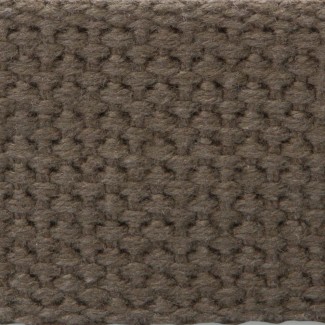When to Use Cotton Webbing or Synthetic Webbing?
What webbing material is ideal for your next project?
 A simple search brings back several options for webbing material. At first glance, the list can be overwhelming, causing choice paralysis, but it is important to make the right choice. Finding a material that best fits your needs is important as they each have pros and cons. One of the most common questions we hear is, "Should I use cotton webbing or a synthetic variant?" We sell polypropylene, polyester, and nylon webbing, as well as cotton and organic cotton. How does a person make a choice?
A simple search brings back several options for webbing material. At first glance, the list can be overwhelming, causing choice paralysis, but it is important to make the right choice. Finding a material that best fits your needs is important as they each have pros and cons. One of the most common questions we hear is, "Should I use cotton webbing or a synthetic variant?" We sell polypropylene, polyester, and nylon webbing, as well as cotton and organic cotton. How does a person make a choice?
-
Performance in Different Environments - One of the primary considerations when choosing a material is the environment in which the material is primarily used. Certain fibers work better in marine environments, whereas some are better suited for long UV exposure.
-
Cotton Webbing and Moisture - Cotton webbing does an excellent job absorbing moisture; the material is unmatched. Cotton is a natural moisture-wicking material that pulls moisture away from the body. The problem with this is that cotton tends to take longer to dry than other materials. Cotton is great for athletic endeavors but is not the best for boats.
-
Synthetic Counterparts - Cotton is suitable for short exposure to moisture, whereas the synthetic variant is quick drying. These materials, when wet, are less comfortable to the touch and prevent the body from breathing (cotton does a better job). Nylon and polyester webbing maintain their strength while wet, which makes them ideal for nautical applications.
-
Thermal Properties and Safety Concerns - Cotton webbing has a safety feature not matched by nylon webbing or other synthetic materials. It is more difficult for cotton to ignite than synthetics, making it the best choice for high-temperature environments or environments with fire/flames. Cotton is a natural fiber, meaning the material will char, not melt. This critical margin of safety can mean the difference between life and death.
-
Synthetics and Fire - Synthetic webbing has a low melting point: once the material begins to melt, the process goes quickly. Melting causes the material to fuse and potentially ignite and catch fire. When discussing colder environments, the tables are turned, and synthetics should be your go-to choice. The melting quality of synthetics is sometimes seen as a benefit for specific applications. Melting causes fusing of the webbing to create sealed ends or when joints are required.
When choosing a webbing material, it is vital to make the right choice. If you have any questions about the difference between options and need answers, please call our talented team!
Related Reading
 A simple search brings back several options for webbing material. At first glance, the list can be overwhelming, causing choice paralysis, but it is important to make the right choice. Finding a material that best fits your needs is important as they each have pros and cons. One of the most common questions we hear is, "Should I use cotton webbing or a synthetic variant?" We sell polypropylene, polyester, and nylon webbing, as well as cotton and organic cotton. How does a person make a choice?
A simple search brings back several options for webbing material. At first glance, the list can be overwhelming, causing choice paralysis, but it is important to make the right choice. Finding a material that best fits your needs is important as they each have pros and cons. One of the most common questions we hear is, "Should I use cotton webbing or a synthetic variant?" We sell polypropylene, polyester, and nylon webbing, as well as cotton and organic cotton. How does a person make a choice?